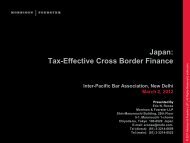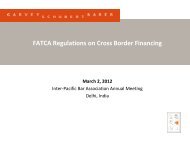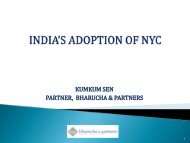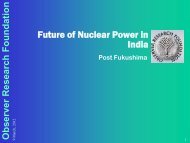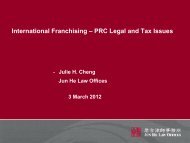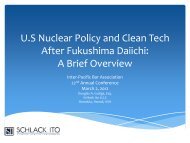The TEPCO Management Crisis:Issues From A D&O ... - IPBA 2012
The TEPCO Management Crisis:Issues From A D&O ... - IPBA 2012
The TEPCO Management Crisis:Issues From A D&O ... - IPBA 2012
Create successful ePaper yourself
Turn your PDF publications into a flip-book with our unique Google optimized e-Paper software.
<strong>IPBA</strong> 2nd March <strong>2012</strong> New Delhi, India.<strong>The</strong> <strong>TEPCO</strong> <strong>Management</strong> <strong>Crisis</strong>:<strong>Issues</strong> <strong>From</strong> A D&O InsurancePerspectiveBY: Aruno RajaratnamSpecialist Insurance Practitioner (Former MD Willis FINEX Asia.)
Definition Of A Business <strong>Crisis</strong>….• Any problem or disruption that triggersnegative stakeholder reactions that couldimpact the organisation's financial strengthand ability to do what it does.Copyright: Institute for <strong>Crisis</strong> <strong>Management</strong> 2011
Definition Of “CRISIS”• A crisis is any natural, accidental or intentional event that severelyimpacts people, property, and/or the environment. Effects mightinclude fatalities, disabling injuries, significant destruction orcontamination, or jeopardize the organization‟s reputation orproducts, threatening a company‟s reputation or its continuedexistence. <strong>The</strong> consequences are independent of company size,quality of management, industry or location.• A major crisis is an event which causes the corporation to lose thebalanced relationship it had enjoyed with its constituents, such asdirectly effected parties, employees, neighbors, financialinstitutions, insurers, industry groups, media, politicians, etc.• Effective crisis management, then, is the systematic recovery of thelost balance.Copyright © 2008 ioMosaic Corporation.
Sudden Vs Smouldering Crises• A smouldering crisis is a problem that starts outsmall and someone within the organisationshould recognise the potential for trouble and fixit before it becomes a public issue.• A sudden crisis is just that.Quote from ICM Report May 2011
<strong>TEPCO</strong> <strong>Crisis</strong> Communication Disaster("THAT WILL NEVER HAPPEN?")• <strong>TEPCO</strong> and <strong>The</strong> Japanese Government were releasingconflicting information. Confused Citizens• Lack of trust + serious damage on the Reputation of theGovernment and <strong>TEPCO</strong>.• Took too long to understand the enormity of the event.<strong>TEPCO</strong> Spokesperson appeared nervous on TV whenurging people to evacuate.CNN REPORTED that a <strong>TEPCO</strong> Executive hadcommented "THAT WILL NEVER HAPPEN" when therewas an earlier opportunity to conduct an exercise for a'worst case scenario'.
A Corporate Backlash• <strong>TEPCO</strong> had about 933,000 Shareholders as at March2011.Financial Institutions.............30%Other Corporations...............5%Individuals (Mostly elderly)..44%Overseas Investors.............17%• <strong>TEPCO</strong> accounted for a hefty 8% of Japan's totaldomestic debt market.May + June 2011: S+P and Moody's cut <strong>TEPCO</strong>'s creditrating to "JUNK".
ALLEGATIONS<strong>The</strong> shareholders main claim is centered on the negligence of the Board:• to take safety measures properly to contain the nuclear crisis at theFukushima plant.• for ignoring decades f safety risks after a number of reports and studieshad highlighted the dangers• for their slow response to the crisis, putting out inaccurate data anddisplaying a lack of transparency"DIRECTORS WILL REPEAT THE SAME MISTAKES UNLESS THEY HAVETAKEN RESPONSIBILITY"63 year old shareholder..Tetsuo Horie.
CORPORATIONS CANNOT GOVERN…By Craig Paterson March 19, 2011 ArticleWhen Tepco, the private utility corporation in Japan, realized theirFukushima Daiichi nuclear reactors were dangerously compromised by therecent massive tsunami, they didn‟t directly intend to harm neighboringcommunities…but their failure to share timely and accurate damageassessments apparently did exactly that.Rather than making an error on the side of caution, they made a selfservingdecision to limit the appearance of urgency or danger. Of course,these can be seen as normal corporate decisions…when those decisionsare allowed to be made without prudent oversight.For decades, corporations have dominated government policies in Japan.Even in the 1970s, the Japanese business community was known as thedriving force in public policy decisions…being known as „Japan, Inc.‟ in theprocess.Now…when strong and decisive public leadership is desperately needed,the Japanese bureaucracy is dangerously ineffectual.Here too…Tepco let things get out-of-control…and then downplayed theseverity of the crisis.Again and again, we see…corporations cannot govern.
A CORPORATE APOLOGY......RATED 3/10!Matsataka Shimizu, President <strong>TEPCO</strong> apologised twice on 11 April and 5 May2011."I would like to extend my sincerest condolences and prayers for the preciousloss of life due to the devastating Tohoku-Chihou-Taiheiyo-Oki Earthquake thatstruck our nation on March 11.Our deepest sorrows go to those people and their families who are sufferingfrom the damage.Furthermore, I deeply apologize for the distress caused due to the extensivedamage that Fukushima Daiichi Nuclear Power Station sustained resulting inthe leakage of radioactive materials to the surrounding areas of the powerstation, Fukushima Prefecture, and broader society.Currently, we are working around the clock to bring the situation under controlwith support and cooperation from the society, related ministries andgovernment offices and local governments.We also regret the tremendous inconvenience the recent rolling blackouts havecaused to our customers and society since March 14th due to the tight supplydemandbalance of electricity.
APOLOGY Cont'dAs a result of widespread cooperation from our customers inconserving electricity, the supply-demand balance has improvedsignificantly.Hence, in principle, we have decided to cease the implementation ofrolling blackouts and will do our best to maintain the supply of electricityaiming to achieve "Zero Rolling Blackouts" in principle during thesummertime.Your continuous cooperation in saving electricity would be highlyappreciated."(April 2011, <strong>The</strong> Tokyo Electric Power Company, Incorporated --Masataka Shimizu, President)<strong>TEPCO</strong> President Shimizu went back to the Fukushima plant in earlyMay 2011 to offer another apology as the disaster escalated."We have caused very serious trouble. We'll soon begin handing outinitial payments, set up consultation centers and respond to people'srequests. Compensation must be provided at all cost."
<strong>TEPCO</strong>'s Corporate Governance(Mission Statement)“At <strong>TEPCO</strong>, we have developed corporate governance policies andpractices as one of the primary management issues for ensuringsustainable growth in our business and long-term shareholder value.We believe in strengthening mutual trust through interactivecommunication with our valued stakeholders, including shareholdersand investors, customers, local communities, suppliers, employees andthe public, so we can move forward toward solid future growth anddevelopment.<strong>The</strong>refore, <strong>TEPCO</strong> considers enhancing corporate governance acritical task for management and is working to develop organizationalstructures and policies for legal and ethical compliance, appropriateand prompt decision making, effective and efficient business practices,and auditing and supervisory functions.”*(A different reality emerged when the crisis struck)
Corporate Governance (Cont'd)Study By <strong>The</strong> Japanese Independent Directors'Network November 2010:Of all the companies on the Nikkei 500 Index:-Outside Directors ......13.5%-Women.......................0.9% (NO WONDER!)*-Non-Japanese............0.17%.
Corporate Governance (Cont'd)<strong>The</strong>re is a difficulty amongst Japanese Corporations inunderstanding how Independent Directors operate.• No need for such intervention 'from the outside'• How can outsiders possibly know enough about thecompany to make a contribution when the other directorshave spent their lives working for the company?• How can an outsider be sensitive to the corporateculture?• <strong>The</strong>y might even damage the harmony of the group
Insurance Implications <strong>From</strong> AD&O Perspective• Not known if <strong>TEPCO</strong> had a D&O Policy.Some Benefits....MAYBE?-<strong>Crisis</strong> Cover-Cover For Past + Present Directors-Legal Representation Expenses even if noWrongful Act.-Criminal Proceedings.....Final AdjudicationClause.-Failure to purchase or maintain relevant/appropriate insurances.
Other Insurance ImplicationsNikkei English news 10 Jan <strong>2012</strong>…<strong>TEPCO</strong> to deposit Yen 120 Billion amid lack of NuclearPlant Insurance.-Difficult to extend insurance contract for Fukushima.-Seeking to reach agreement with FOREIGN Insurer as 23local Japanese insurers have refused to extend the currentprogram for fear of a far greater accident.-Heavier financial burden than an Insurance contract.
CONCLUSIONDo Not ignore your insurance requirements.It can be a multi million dollar ASSET.It can RESCUE your Balance Sheet......And your personal fortunes too!



